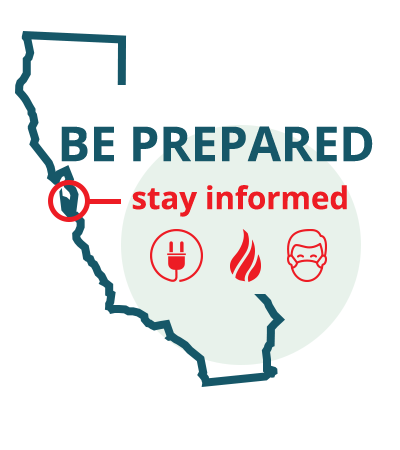Gather Emergency Supplies
Now is the time to gather and pack your emergency supplies. Do not wait until authorities order you to evacuate. That will delay your evacuation in a dangerous situation when every minute counts. It also makes it likely that you will leave vital items behind.
You should pack enough supplies to last you and your family for at least three days. Remember to pack the three P’s: personal items, paperwork and prescriptions. The basics are covered below. For more details, visit the Centers for Disease Control and Prevention (CDC) website.
Personal needs
Water
- At least three gallons of water per person for your to-go emergency rations
- Pregnant women and sick people make need more water
- Store at least two weeks’ worth of water at home
Learn more about preparing a home water supply at cdc.gov
Food
- At least three days’ worth of non-perishable food (such as dry or canned goods)
- Cups, plates, bowls, utensils, food containers, can opener and camping stove
- Vitamins and supplements that you take
- If you have pets, pack food for them as well
Learn more about emergency food supplies at ready.gov
Clothing and bedding
- A complete change of warm clothes for everyone, including jackets and study shoes
- Sleeping bags or blankets
If you have an infant
- Diapers
- Baby formula or breastfeeding supplies
- A portable crib
First aid kit
- Bandages
- Hand sanitizer
- Antibiotic ointment
- Thermometer
- Any over-the-counter medications you may need (such as pain relief or allergy pills)
Other supplies
- Phone charger (including one that can be used in your car)
- Radio (preferably with a hand-crank and USB ports for charging your phone)
- Flashlights
- Batteries
- Area map
- Cash (in large and small bills)
Prescriptions
- A supply of all your medications – ask your primary care provider (PCP) or pharmacist:
- How much medication supply you need for your emergency kit
- Whether any of your meds need to be kept in a cooler
- How much medication supply you need for your emergency kit
- A copy of your prescription medicines list that indicates what each one is for, the amount you take and how frequently you take them
- Any medical devices you may use (such as eyeglasses, contacts, a hearing aid, diabetes blood monitor, asthma inhalers or walker)
Paperwork
- Important documents or copies that you can use for identification (such as a passport, driver’s license, social security card or birth certificate)
- Important health documents or copies (such as your HPSM member ID card)
- Any specific instructions on how to take care of you or family members in an emergency
